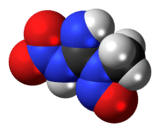Methylnitronitrosoguanidine
 | |
 | |
| Names | |
|---|---|
| IUPAC name
1-methyl-3-nitro-1-nitrosoguanidine | |
| Other names
N-Methyl-N-nitroso-N′-nitroguanidine; N-Methyl-N′-nitro-N-nitrosoguanidine | |
| Identifiers | |
| 70-25-7 | |
| 3D model (Jmol) | Interactive image |
| Abbreviations | MNNG |
| ChemSpider | 6025 |
| ECHA InfoCard | 100.000.664 |
| KEGG | C14592 |
| PubChem | 6261 |
| |
| |
| Properties | |
| C2H5N5O3 | |
| Molar mass | 147.09 g/mol |
| Appearance | Yellow crystals |
| Melting point | 118 °C (244 °F; 391 K) (decomposes) |
| reacts violently, slowly hydrolysed | |
| Except where otherwise noted, data are given for materials in their standard state (at 25 °C [77 °F], 100 kPa). | |
| | |
| Infobox references | |
Methylnitronitrosoguanidine (MNNG or MNG) is a biochemical tool used experimentally as a carcinogen and mutagen.[1] It acts by adding alkyl groups to the O6 of guanine and O4 of thymine, which can lead to transition mutations between GC and AT. These changes do not cause a heavy distortion in the double helix of DNA and thus are hard to detect by the DNA mismatch repair system.
In organic chemistry, MNNG is used as a source of diazomethane when reacted with aqueous potassium hydroxide.[2]
MNNG is a probable human carcinogen listed as an IARC Group 2A carcinogen.[3]
References
- 1 2 Merck Index, 11th Edition, 6017.
- ↑ Aldrichimica Acta. 16 (3). 1983. Missing or empty
|title=(help) - ↑ N-METHYL-N'-NITRO-N-NITROSOGUANIDINE (MNNG), International Agency for Research on Cancer
This article is issued from Wikipedia - version of the 6/2/2016. The text is available under the Creative Commons Attribution/Share Alike but additional terms may apply for the media files.